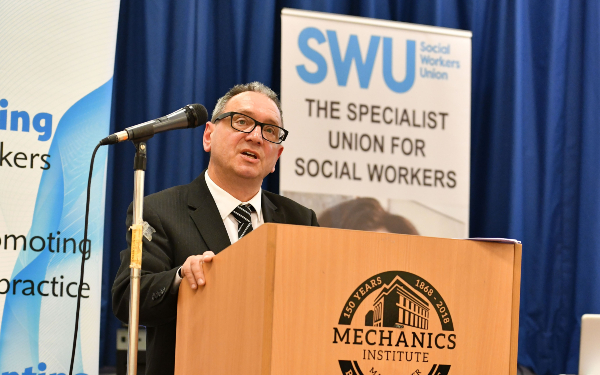
“Our inbox was constant about PPE…The initial stages were a shock to everyone, we had members dying, we had members who were in crisis, we had members who were taking hot water bottles and flasks so they could wash their own hands and that was unacceptable. But we couldn’t do anything about that.” So recalls John McGowan, recently re-elected general secretary of the Social Workers Union (SWU), of the early days of the pandemic.
The number of referrals to the union went “right through the roof” as members were placed under different terms of employment due to changing working practices.
McGowan continues: “We provided enhanced 1-1 consultations through our duty service to support members and raise issues with employers. This led to significant changes from employers with some employers challenged formally to change guidance on safety.”
Among the measures taken by SWU to help members were launching with the British Association of Social Workers (BASW) the social worker wellbeing and working conditions: good practice toolkit and developing a position statement to support members’ health and safety.
Growing membership
SWU was created by BASW in 2011 to enable it to offer union-style services to members. The two organisations remain linked, with SWU membership offered as an additional benefit for BASW members for an extra £25 a year. McGowan, who was involved from the beginning, became the first independent general secretary of SWU in 2016.
McGowan says the rise in SWU’s membership illustrates how the pandemic has made people think about the protections they need at work. Previously, he says, social workers tended to consider joining a union after something goes wrong, “like joining the AA or RAC once your car breaks down”.
He adds: “I think that mindsight is moving now, and social workers are more proactive and understand their working conditions can be in decline, and they can do about that by joining a trade union.”
The biggest social work union, UNISON, has 40,000 members in the UK, but many social workers are not unionised.
“One of the major wishes I would have is that more people consider joining a trade union and a professional association,” says McGowan. “There are 105,000 social workers in the UK. There are a lot of social workers who are not members of anything and I think we need to emphasise in the very early days, ‘you’re a professional why don’t you join a professional association?’”
He adds: “It doesn’t have to be my union. I just want them to join something to take that forward.”
Benefits of specialism
McGowan highlights the benefits of SWU being a dedicated social work union. Excepting such roles as administrative staff, all those involved in SWU casework are social workers, a factor McGowan describes as “worth its weight in gold, because we understand the profession”, which he says helps his members.
He says: “When we negotiate settlement agreements, when we negotiate employment concerns and workers come out the other end and they stay in the profession, that’s a positive.
Staying in practice

John McGowan (Photo: Simon Hadley)
Like his SWU colleagues McGowan remains a registered social worker and continues to actively practise as circumstances allow. His career has included working on the Isle of Skye and the small islands, off the west coast of Scotland, along with the Kintyre peninsula.
The close nature of these communities meant that he might meet someone in a supermarket he had done a child protection referral on, or see someone he’d visited in the public swimming pool.
Having worked in the city as well, he says his career has ranged from young people involved in knife crime to those involved in stealing tractors.
SWU is not involved in collectively bargaining on behalf of social workers in relation to their terms and conditions. Instead, in local authorities, this is done by UNISON, Unite and GMB through the National Joint Council for Local Government Services.
“Our union is more than just collective bargaining, it’s more than just pay, it’s about your working conditions and employment representation,” McGowan says.
Sharing the profession’s good news
McGowan adds that many local authorities are offering good support and working conditions to their social workers. These authorities are “retaining staff, and people also want to work for them”. He reveals that he writes directly to the directors in authorities where he hears of good work being done, noting “the surprise is overwhelming sometimes”.
The good work being done by social workers is something McGowan laments the sector does not have the opportunity to tell as much as the difficult stories.
He says: “I think the reality is in the UK we’ve got probably the smallest amount of child deaths or adults deaths due to social workers’ mistakes probably in the whole of Europe or the world; we’re really tight on all our assessments and we forget to tell that tale”.


 Bournemouth, Christchurch and Poole
Bournemouth, Christchurch and Poole  Hampshire County Council
Hampshire County Council  Lincolnshire County Council
Lincolnshire County Council  Norfolk County Council
Norfolk County Council  Northamptonshire Children’s Trust
Northamptonshire Children’s Trust  South Gloucestershire Council
South Gloucestershire Council  Wiltshire Council
Wiltshire Council  Wokingham Borough Council
Wokingham Borough Council  Children and young people with SEND are ‘valued and prioritised’ in Wiltshire, find inspectors
Children and young people with SEND are ‘valued and prioritised’ in Wiltshire, find inspectors  How specialist refugee teams benefit young people and social workers
How specialist refugee teams benefit young people and social workers  Podcast: returning to social work after becoming a first-time parent
Podcast: returning to social work after becoming a first-time parent  Podcast: would you work for an inadequate-rated service?
Podcast: would you work for an inadequate-rated service?  Family help: one local authority’s experience of the model
Family help: one local authority’s experience of the model  Workforce Insights – showcasing a selection of the sector’s top recruiters
Workforce Insights – showcasing a selection of the sector’s top recruiters 

 Facebook
Facebook X
X LinkedIn
LinkedIn Instagram
Instagram
Comments are closed.